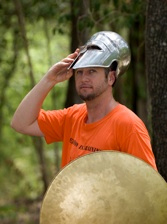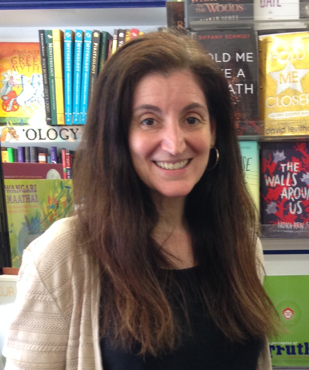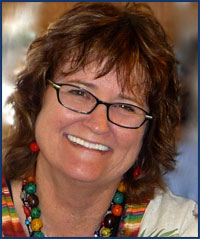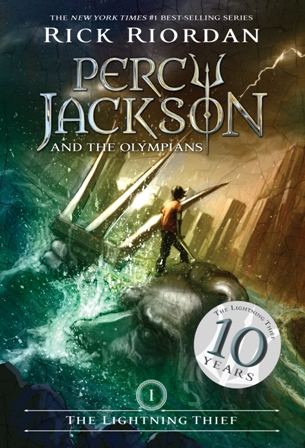Also published on this date: Shelf Awareness Pro for Tuesday, June 16, 2015
Tuesday, June 16, 2015: Dedicated Issue: Celebrating Rick Riordan
Editors' Note
With the support of Disney Publishing Worldwide, Shelf Awareness celebrates the 10th Anniversary of Percy Jackson, The Lightning Thief and author Rick Riordan's foray into children's book publishing. The interviews were written by Jennifer M. Brown.
Books & Authors
Rick Riordan: "Norse Mythology Turned Me into a Reader"

photo: Michael Frost
Ten years ago, Rick Riordan published his first book for young people, The Lightning Thief, which introduced Percy Jackson, a young man with a mortal mother and fathered by a Greek god. Since then, Riordan's career has skyrocketed higher than Mount Olympus: he extended the Percy Jackson and the Olympians series for an older audience with his Heroes of Olympus series; has spun off the Kane Chronicles, featuring Egyptian gods; and on October 6, Disney will publish Magnus Chase and the Gods of Asgard, Book One: The Sword of Summer, the first in a series rooted in Norse mythology. We talked with him about his past, present and future.
What prompted you to turn to Norse mythology? Was it the next natural frontier after Greek and Egyptian mythologies?
Norse mythology was actually my first love, even before Greek mythology. My gateway into reading was The Lord of the Rings. From there, my eighth-grade English teacher introduced me to the Norse myths, upon which Tolkien's work is based, and I have been a major fan of the myths ever since. I was also a fan of the Thor comics back in the 1970s.
I've always wanted to do something based on Norse mythology, but Percy Jackson happened to be the story that sprang to life first because my son was interested in Greek mythology at the time. Still, the idea for Magnus Chase has been with me for years. I have outlines of the general premise going back to at least 2007. In a very satisfying way, this series is coming full circle for me. Norse mythology turned me into a reader. Now, at last, I get to do my own take on it as a novelist.
Why is your hero, Magnus, 16? Is that because he has been homeless since his mother's death? Because it seems that the subject matter would be appropriate for Percy Jackson fans, too.
I liked the idea of starting Magnus a little older because I enjoyed writing from that age-level point of view in the Heroes of Olympus series. Also, his story had to fit the timeline of his cousin, Annabeth Chase, so he couldn't have been very much younger than she was. (And she is now 17.) I wanted them to know each other and interact during the course of the Magnus Chase books. You don't need to read any of the Percy Jackson books to read Magnus Chase, but if you know Annabeth from those books, this will add a lot to your understanding of her family history.
As for the readership, I am aiming at the same demographic--the middle grades. Magnus is a bit older, but the content, interest level, reading level and everything else are pretty much the same as my other books. I still consider this very much a middle-grade novel. (Though older readers, as always, are very welcome!)
As you did your research, did you come across any information that surprised you?
The main thing that struck me was how little we have in the way of primary sources. Even the Prose Edda and the Poetic Edda, our main written accounts of Norse mythology, have to be viewed through a certain lens, as they were written when the myths were already fading from cultural memory. Snorri Sturluson, the writer of the Prose Edda, had to distance himself from the pagan religion because he lived in a Christian society. He even tried to tie the Norse gods into the heritage of the Greco-Roman world. He tells the reader that the Norse gods were probably mortals from Byzantium who came north, appeared like gods to the locals, and became kings. I chose to ignore that theory! I was also surprised that there is no clear consensus on which worlds constitute the Nine Worlds. Sometimes Svartalfheim is a separate world. Sometimes not. Same with Helheim. The Norse have left us a lot of blank space to fill in with interpretation.
I'm a huge fan of Viking lore, and Valhalla is quite the mythical place. Yet you've added so much to the experience, with Magnus's room containing all of his favorite things. Did you have fun imagining what it might be like?
Oh, I love the Hotel Valhalla. That core idea is something I've been keeping in my mind for years. As always, I tried to stay close to the myths and be accurate with how Valhalla is described, but it wasn't much of stretch to see it as the ultimate resort hotel. The honored dead, after all, aren't meant to stay in Valhalla forever. It's simply their temporary home until they are called forth to battle at Ragnarok. While you're waiting for Doomsday, why not enjoy the room service menu, a few spa treatments, dragon fighting and the whitewater rafting experience? You have to live a little when you're dead!
A "heaven" for valiant Vikings in which they get to keep doing battle is quite a twist on the Christian concept. Is there something in the mythology about wolves doing clean-up, or was that your addition?
It is strange to think of eternal combat as a reward, but that was the Viking ideal: feast, fight, die--then get resurrected and do it all over again. It was a challenge to see if I could make this palatable to a modern audience without making it seem terrifying. I think I pulled it off, though Hotel Valhalla is definitely a different place than Camp Half-Blood! The wolves were Odin's sacred animals because they cleaned up the dead on the battlefield, so it didn't seem like much of a reach that they would also clear the bodies from the lobby if the Viking Monopoly games got a little too heated.
Magnus faces some big challenges--surviving on his own, relying upon other homeless people he trusts, then going on his instincts once he's among the inhabitants of Valhalla. How do you walk that line between humor and violence?
I think learning to walk the line comes from teaching middle school so many years. Kids that age are drawn to the gross and the macabre, but obviously the teacher has to be mindful to keep it within comfortable limits. I write the same way I teach--always trying to keep the audience's attention, but doing my best to keep it at a middle-school-appropriate level. Humor is a great way to break the tension when things get violent or serious. Shakespeare was a master at this. The bloodier the murder, the more likely you'll have a fool in the next scene making bawdy jokes. (See: Macbeth's doorkeeper.)
You also let us know that Magnus will be okay, despite the dangers he faces; you describe the way passersby might observe him as a homeless person, yet it never feels didactic. How do you get the right tone? Does it all come from Magnus's (and Percy's and Carter's) voice?
Like so many of my characters, Magnus is loosely based on former students of mine. I've taught a number of homeless kids over the years. One boy lived in a car with his dad. Another girl moved from shelter to shelter with her mom who struggled with drug addiction. This is a tragic reality in our society, and it was my doorway into understanding Magnus' character. If his voice sounds genuine--and I hope it does--it's because I've known and taught kids like him, and I try to put myself in his place.
Can you give us a teaser to what's next in this series?
The plan right now is for at least three books in the series. The title for book two is announced at the end of The Sword of Summer, and the groundwork for that adventure is laid in the first novel. By the time readers finish The Sword of Summer, I think they'll have a pretty good idea what quest awaits Magnus next. At the risk of a spoiler, I think I can say: It's hammer time.
Is there anything we haven't covered that you'd like your readers to know?
Blitzen the dwarf would like readers to know that vests are making a comeback, chainmail is acceptable to wear at a formal event, and vertical stripes are wonderful for making you look taller, especially if you accessorize with a broadsword. (This will make sense after you meet Blitzen.)
Why Booksellers Love Rick Riordan

Topher Bradfield
When The Lightning Thief debuted in June of 2005, a young avid Percy Jackson fan asked BookPeople's Topher Bradfield, "Wouldn't it be cool to go to Camp Half-Blood for real?"
Bradfield responded by kicking off one session of Camp Half-Blood in the summer of 2006 in Austin, Tex., with 52 attendees. This summer, the bookstore will hold eight weeks of camp, with 100-110 attendees per week. In addition to Camp Half-Blood, BookPeople also hosts Camp Kane (based on Riordan's The Kane Chronicles), and last year he introduced the Norse myths–themed Magnus Chase story line into the camps. Bradfield also consulted with the founders of a Camp Half-Blood in Brooklyn and Camp Demigod in Point Roberts, Wash., near Vancouver.

Heather Herbert
"We're boning up on our Norse books; we've bought more Norse myths than you can imagine," said Heather Herbert, manager of Children's Book World, Haverford, Penn. "Disney does a great job of prepping everyone, so our customers know months in advance [about a new Rick Riordan release]. Herbert describes a "low hum" the month before a new Riordan book comes in, and the store starts getting calls in the days leading up to the release date. "The day before, they'll call and ask, 'Did you get anything early?' " Herbert reported.

Kimberley Jones
Kimberly Jones, store manager of Little Shop of Stories in Decatur, Ga., also describes having "a huge Rick Riordan fan base." Jones said, "Last time we hosted Rick, in fall 2014, we held the event at an auditorium that held 1,200 kids. We probably could have filled that auditorium twice." People drove from all over Georgia to attend. Little Shop of Stories also organizes summer book-related camps, including Camp Kane and Camp Half-Blood. "Parents slept outside the store overnight to sign up," Jones said. "We sold out within 40 minutes."

Melissa Fox
At Watermark Books in Wichita, Kan., children's event coordinator Melissa Fox is planning a Greek Mythology Party on August 22, timed for the Saturday after Percy Jackson's Greek Heroes is released. "My kids, who are huge fans, are over-the-moon excited," Fox said. She often finds out from them when a new Riordan book is coming. "Have you heard about the new Magnus Chase?" they'll ask her. "Rick's got a huge Internet presence. A lot of his readers are younger than Twitter and Tumblr users," Fox said, explaining, "They often find out from their older siblings."

Valerie Lewis
Valerie Lewis, co-owner of Hicklebee's in San Jose, Calif., has already started promoting Magnus Chase. Anyone who pre-purchases the book (before October 5) will get a 20% discount. Lewis remembers meeting Rick Riordan 10 years ago in San Francisco in a little bar. "I was meeting him so I could take him to an NCIBA event, and introduce him to the other booksellers," Lewis recalled. "It doesn't seem that long ago. Now he's a schoolhold name and a household name. It's been really fun watching him ride this roller coaster since then."
Happy 10th Anniversary, Percy Jackson!
Disney Hyperion is partnering with Big Honcho Media to launch a six-month-long Percy Jackson Ambassador campaign, in celebration of the 10th anniversary of Rick Riordan's The Lightning Thief. The campaign will lead into the releases of Percy Jackson's Greek Heroes (August 18) and Magnus Chase and the Gods of Asgard, Book One: The Sword of Summer (October 6).
 Fifty influential bloggers--dubbed "The Percy Pack"--will write articles, share news items and spotlight limited-run teaser mailings and promotional items, and participate in online Twitter and other social media events. The goal is to expand the existing, dedicated fan base even more by introducing newcomers to Percy Jackson and to Magnus Chase this October.
Fifty influential bloggers--dubbed "The Percy Pack"--will write articles, share news items and spotlight limited-run teaser mailings and promotional items, and participate in online Twitter and other social media events. The goal is to expand the existing, dedicated fan base even more by introducing newcomers to Percy Jackson and to Magnus Chase this October.
The Lightning Thief, the book that launched the Percy Jackson and the Olympians series, has sold millions of copies worldwide, appears on school reading lists across the country, and inspired a major motion picture.
Among the accolades:
- Time magazine's 2014 List of 100 Best Young-Adult Books of All Time
- a New York Times Notable Book of 2015
- a Child magazine Best Book of the Year
- School Library Journal Best Book of 2005
- more than six years on the New York Times bestseller list (and counting!)
This week (June 15-22), to coincide with the 10th anniversary, The Lightning Thief will be discounted to $.99 across all e-book accounts for the entire week . This e-book edition includes a sneak peek chapter excerpt from Magnus Chase and the Gods of Asgard, Book One: The Sword of Summer.
Visit ReadRiordan.com to download the special 10th Anniversary Percy Pack Activity Kit.
Editors' Note
Books & Authors
Rick Riordan: "Norse Mythology Turned Me into a Reader"
 |
|
| photo: Michael Frost | |
Ten years ago, Rick Riordan published his first book for young people, The Lightning Thief, which introduced Percy Jackson, a young man with a mortal mother and fathered by a Greek god. Since then, Riordan's career has skyrocketed higher than Mount Olympus: he extended the Percy Jackson and the Olympians series for an older audience with his Heroes of Olympus series; has spun off the Kane Chronicles, featuring Egyptian gods; and on October 6, Disney will publish Magnus Chase and the Gods of Asgard, Book One: The Sword of Summer, the first in a series rooted in Norse mythology. We talked with him about his past, present and future.
What prompted you to turn to Norse mythology? Was it the next natural frontier after Greek and Egyptian mythologies?
Norse mythology was actually my first love, even before Greek mythology. My gateway into reading was The Lord of the Rings. From there, my eighth-grade English teacher introduced me to the Norse myths, upon which Tolkien's work is based, and I have been a major fan of the myths ever since. I was also a fan of the Thor comics back in the 1970s.
I've always wanted to do something based on Norse mythology, but Percy Jackson happened to be the story that sprang to life first because my son was interested in Greek mythology at the time. Still, the idea for Magnus Chase has been with me for years. I have outlines of the general premise going back to at least 2007. In a very satisfying way, this series is coming full circle for me. Norse mythology turned me into a reader. Now, at last, I get to do my own take on it as a novelist.
Why is your hero, Magnus, 16? Is that because he has been homeless since his mother's death? Because it seems that the subject matter would be appropriate for Percy Jackson fans, too.
I liked the idea of starting Magnus a little older because I enjoyed writing from that age-level point of view in the Heroes of Olympus series. Also, his story had to fit the timeline of his cousin, Annabeth Chase, so he couldn't have been very much younger than she was. (And she is now 17.) I wanted them to know each other and interact during the course of the Magnus Chase books. You don't need to read any of the Percy Jackson books to read Magnus Chase, but if you know Annabeth from those books, this will add a lot to your understanding of her family history.
As for the readership, I am aiming at the same demographic--the middle grades. Magnus is a bit older, but the content, interest level, reading level and everything else are pretty much the same as my other books. I still consider this very much a middle-grade novel. (Though older readers, as always, are very welcome!)
As you did your research, did you come across any information that surprised you?
The main thing that struck me was how little we have in the way of primary sources. Even the Prose Edda and the Poetic Edda, our main written accounts of Norse mythology, have to be viewed through a certain lens, as they were written when the myths were already fading from cultural memory. Snorri Sturluson, the writer of the Prose Edda, had to distance himself from the pagan religion because he lived in a Christian society. He even tried to tie the Norse gods into the heritage of the Greco-Roman world. He tells the reader that the Norse gods were probably mortals from Byzantium who came north, appeared like gods to the locals, and became kings. I chose to ignore that theory! I was also surprised that there is no clear consensus on which worlds constitute the Nine Worlds. Sometimes Svartalfheim is a separate world. Sometimes not. Same with Helheim. The Norse have left us a lot of blank space to fill in with interpretation.
I'm a huge fan of Viking lore, and Valhalla is quite the mythical place. Yet you've added so much to the experience, with Magnus's room containing all of his favorite things. Did you have fun imagining what it might be like?
Oh, I love the Hotel Valhalla. That core idea is something I've been keeping in my mind for years. As always, I tried to stay close to the myths and be accurate with how Valhalla is described, but it wasn't much of stretch to see it as the ultimate resort hotel. The honored dead, after all, aren't meant to stay in Valhalla forever. It's simply their temporary home until they are called forth to battle at Ragnarok. While you're waiting for Doomsday, why not enjoy the room service menu, a few spa treatments, dragon fighting and the whitewater rafting experience? You have to live a little when you're dead!
A "heaven" for valiant Vikings in which they get to keep doing battle is quite a twist on the Christian concept. Is there something in the mythology about wolves doing clean-up, or was that your addition?
It is strange to think of eternal combat as a reward, but that was the Viking ideal: feast, fight, die--then get resurrected and do it all over again. It was a challenge to see if I could make this palatable to a modern audience without making it seem terrifying. I think I pulled it off, though Hotel Valhalla is definitely a different place than Camp Half-Blood! The wolves were Odin's sacred animals because they cleaned up the dead on the battlefield, so it didn't seem like much of a reach that they would also clear the bodies from the lobby if the Viking Monopoly games got a little too heated.
Magnus faces some big challenges--surviving on his own, relying upon other homeless people he trusts, then going on his instincts once he's among the inhabitants of Valhalla. How do you walk that line between humor and violence?
I think learning to walk the line comes from teaching middle school so many years. Kids that age are drawn to the gross and the macabre, but obviously the teacher has to be mindful to keep it within comfortable limits. I write the same way I teach--always trying to keep the audience's attention, but doing my best to keep it at a middle-school-appropriate level. Humor is a great way to break the tension when things get violent or serious. Shakespeare was a master at this. The bloodier the murder, the more likely you'll have a fool in the next scene making bawdy jokes. (See: Macbeth's doorkeeper.)
You also let us know that Magnus will be okay, despite the dangers he faces; you describe the way passersby might observe him as a homeless person, yet it never feels didactic. How do you get the right tone? Does it all come from Magnus's (and Percy's and Carter's) voice?
Like so many of my characters, Magnus is loosely based on former students of mine. I've taught a number of homeless kids over the years. One boy lived in a car with his dad. Another girl moved from shelter to shelter with her mom who struggled with drug addiction. This is a tragic reality in our society, and it was my doorway into understanding Magnus' character. If his voice sounds genuine--and I hope it does--it's because I've known and taught kids like him, and I try to put myself in his place.
Can you give us a teaser to what's next in this series?
The plan right now is for at least three books in the series. The title for book two is announced at the end of The Sword of Summer, and the groundwork for that adventure is laid in the first novel. By the time readers finish The Sword of Summer, I think they'll have a pretty good idea what quest awaits Magnus next. At the risk of a spoiler, I think I can say: It's hammer time.
Is there anything we haven't covered that you'd like your readers to know?
Blitzen the dwarf would like readers to know that vests are making a comeback, chainmail is acceptable to wear at a formal event, and vertical stripes are wonderful for making you look taller, especially if you accessorize with a broadsword. (This will make sense after you meet Blitzen.)
Why Booksellers Love Rick Riordan
 |
|
| Topher Bradfield | |
When The Lightning Thief debuted in June of 2005, a young avid Percy Jackson fan asked BookPeople's Topher Bradfield, "Wouldn't it be cool to go to Camp Half-Blood for real?"
Bradfield responded by kicking off one session of Camp Half-Blood in the summer of 2006 in Austin, Tex., with 52 attendees. This summer, the bookstore will hold eight weeks of camp, with 100-110 attendees per week. In addition to Camp Half-Blood, BookPeople also hosts Camp Kane (based on Riordan's The Kane Chronicles), and last year he introduced the Norse myths–themed Magnus Chase story line into the camps. Bradfield also consulted with the founders of a Camp Half-Blood in Brooklyn and Camp Demigod in Point Roberts, Wash., near Vancouver.
 |
|
| Heather Herbert | |
"We're boning up on our Norse books; we've bought more Norse myths than you can imagine," said Heather Herbert, manager of Children's Book World, Haverford, Penn. "Disney does a great job of prepping everyone, so our customers know months in advance [about a new Rick Riordan release]. Herbert describes a "low hum" the month before a new Riordan book comes in, and the store starts getting calls in the days leading up to the release date. "The day before, they'll call and ask, 'Did you get anything early?' " Herbert reported.
 |
|
| Kimberley Jones | |
Kimberly Jones, store manager of Little Shop of Stories in Decatur, Ga., also describes having "a huge Rick Riordan fan base." Jones said, "Last time we hosted Rick, in fall 2014, we held the event at an auditorium that held 1,200 kids. We probably could have filled that auditorium twice." People drove from all over Georgia to attend. Little Shop of Stories also organizes summer book-related camps, including Camp Kane and Camp Half-Blood. "Parents slept outside the store overnight to sign up," Jones said. "We sold out within 40 minutes."
 |
|
| Melissa Fox | |
At Watermark Books in Wichita, Kan., children's event coordinator Melissa Fox is planning a Greek Mythology Party on August 22, timed for the Saturday after Percy Jackson's Greek Heroes is released. "My kids, who are huge fans, are over-the-moon excited," Fox said. She often finds out from them when a new Riordan book is coming. "Have you heard about the new Magnus Chase?" they'll ask her. "Rick's got a huge Internet presence. A lot of his readers are younger than Twitter and Tumblr users," Fox said, explaining, "They often find out from their older siblings."
 |
|
| Valerie Lewis | |
Valerie Lewis, co-owner of Hicklebee's in San Jose, Calif., has already started promoting Magnus Chase. Anyone who pre-purchases the book (before October 5) will get a 20% discount. Lewis remembers meeting Rick Riordan 10 years ago in San Francisco in a little bar. "I was meeting him so I could take him to an NCIBA event, and introduce him to the other booksellers," Lewis recalled. "It doesn't seem that long ago. Now he's a schoolhold name and a household name. It's been really fun watching him ride this roller coaster since then."
Happy 10th Anniversary, Percy Jackson!
Disney Hyperion is partnering with Big Honcho Media to launch a six-month-long Percy Jackson Ambassador campaign, in celebration of the 10th anniversary of Rick Riordan's The Lightning Thief. The campaign will lead into the releases of Percy Jackson's Greek Heroes (August 18) and Magnus Chase and the Gods of Asgard, Book One: The Sword of Summer (October 6).
 Fifty influential bloggers--dubbed "The Percy Pack"--will write articles, share news items and spotlight limited-run teaser mailings and promotional items, and participate in online Twitter and other social media events. The goal is to expand the existing, dedicated fan base even more by introducing newcomers to Percy Jackson and to Magnus Chase this October.
Fifty influential bloggers--dubbed "The Percy Pack"--will write articles, share news items and spotlight limited-run teaser mailings and promotional items, and participate in online Twitter and other social media events. The goal is to expand the existing, dedicated fan base even more by introducing newcomers to Percy Jackson and to Magnus Chase this October.
The Lightning Thief, the book that launched the Percy Jackson and the Olympians series, has sold millions of copies worldwide, appears on school reading lists across the country, and inspired a major motion picture.
Among the accolades:
- Time magazine's 2014 List of 100 Best Young-Adult Books of All Time
- a New York Times Notable Book of 2015
- a Child magazine Best Book of the Year
- School Library Journal Best Book of 2005
- more than six years on the New York Times bestseller list (and counting!)
This week (June 15-22), to coincide with the 10th anniversary, The Lightning Thief will be discounted to $.99 across all e-book accounts for the entire week . This e-book edition includes a sneak peek chapter excerpt from Magnus Chase and the Gods of Asgard, Book One: The Sword of Summer.
Visit ReadRiordan.com to download the special 10th Anniversary Percy Pack Activity Kit.








